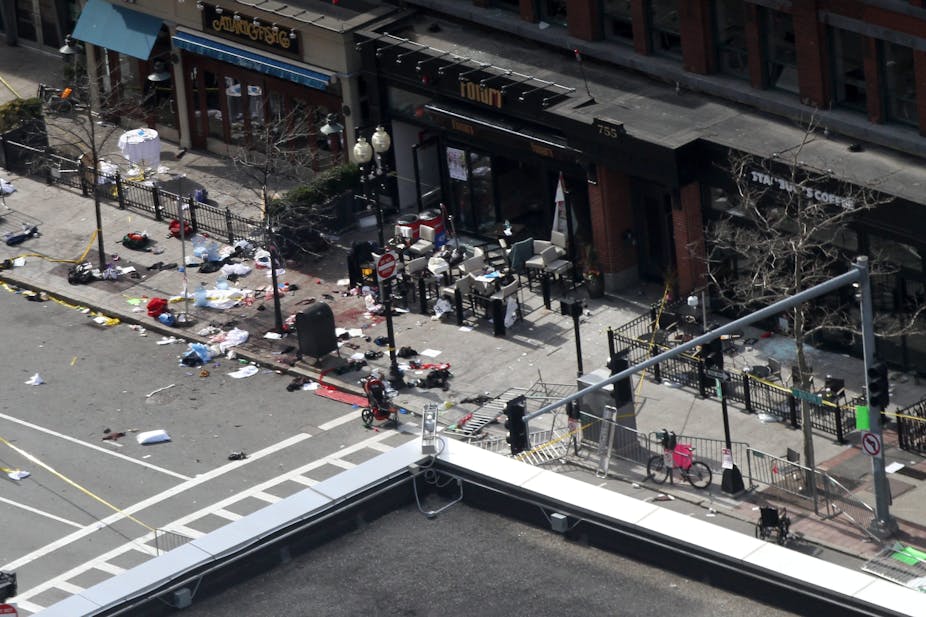Winters in Boston are bitterly cold and excessively long. So it’s little wonder that residents greet Patriot’s Day – the mid-April, Massachusetts-only holiday marking the Revolutionary battles at Lexington and Concord – with such enthusiasm. To mark the ritual start of spring, Bostonians pack Fenway Park to watch the Red Sox, and they line Boylston Street to cheer on the finishers of the prestigious Boston Marathon.
Yesterday that festive atmosphere disappeared in an instant, as two shrapnel-laden bombs tore through crowds gathered near the marathon’s finish line. The devices detonated ten seconds and 100 metres apart, leaving at least three dead and over 170 wounded.
Though the Obama administration did not formally call the bombings an act of terrorism until Tuesday morning, it was hard not to draw parallels to the September 11th attacks twelve years ago: the gruesome images, the wandering and uncertain bystanders, the unbroken media coverage.
As they did twelve years ago, most Americans witnessed the attack and its aftermath through a constant stream of news reporting. Within an hour of the explosions, news networks switched over to wall-to-wall coverage, chasing rumours of additional bombs and wrangling interviews with eyewitnesses.
With little information to go on, anchors had ample time to speculate. Yet they resisted the urge: when counterterrorism experts appeared on the news network MSNBC, the hosts repeatedly emphasised the importance of avoiding speculation that was not based on well-sourced information.
Such restraint was a sign that news media have learned from the last few decades of covering terrorist attacks on American soil. Eighteen years ago this week, a truck bomb in Oklahoma City killed 168 people and injured nearly 700 others. Media speculation immediately after the attack centred on Middle Eastern organisations, but investigation soon revealed the terrorists were home-grown: anti-government militiamen striking out at the federal government.
In contrast, on-air journalists have, for the most part, been careful not to hypothesise about those responsible for Monday’s attack.
Americans’ experience of Monday’s attack differed from previous attacks in another way as well: the prevalence of social media. In 2001, only about half of American households had internet access. There was no Facebook, no Twitter. The first smartphone had been introduced in the United States only a few months before the September 11th attacks. As the day unfolded, most Americans followed on television and radio. The few eyewitness recordings came from tourists with video cameras.

Yesterday’s attack unfolded over Twitter, Facebook, Vine, and Reddit, along with innumerable news sites. Reports poured in from runners and bystanders. Video and photographs made their way onto the internet in a matter of minutes.
Google deployed its Person Finder to reunite those separated in the chaos – a far cry from the handwritten onsite pleas and the scattered online sites after September 11th.
Moreover, Americans following on Twitter found not chaos and misinformation but caution and careful curation of breaking news. As news of the bombings broke, the Atlantic’s James Fallows tweeted, “Wait until it’s KNOWN. Immediate speculation has very bad track record for accuracy.”
Like Fallows, other tweeters consistently warned against retweeting speculation and gossip, and quickly quashed rumours and erroneous information. It wasn’t perfect, but the site functioned well as mobile service in the city failed and major websites such as the Boston Globe crashed.
The media experience surrounding terrorism in the United States has changed, and so has the lived experience. “We are a hardened people now, compared to the nation of civilians caught unaware on 9/11,” Walter Russell Mead observed this morning. “We have lost the illusion that the 21st century will be a time without tragedy and testing.”
Yet some things have not changed. A much-circulated video shows Fred Rogers (the beloved host of Mister Rogers’ Neighborhood) relaying advice his mother gave him when something bad happened on the news: “Look for the helpers. You will always find people who are helping.”
And so it was in Boston. The runners who, having just finished the 26.2-mile race, kept running to area hospitals to donate blood. The on-site emergency workers who turned belts into tourniquets to stop life-threatening blood loss. The Bostonians who opened their homes to displaced runners and spectators.
When President Obama addressed the nation this morning, he catalogued the acts of generosity and heroism that took place in Boston, then said: “So if you want to know who we are, what America is, how we respond to evil — that’s it. Selflessly. Compassionately. Unafraid.”
Much has changed in the United States since the terror attacks that gripped the nation twelve years ago, but this spirit remains the same.

